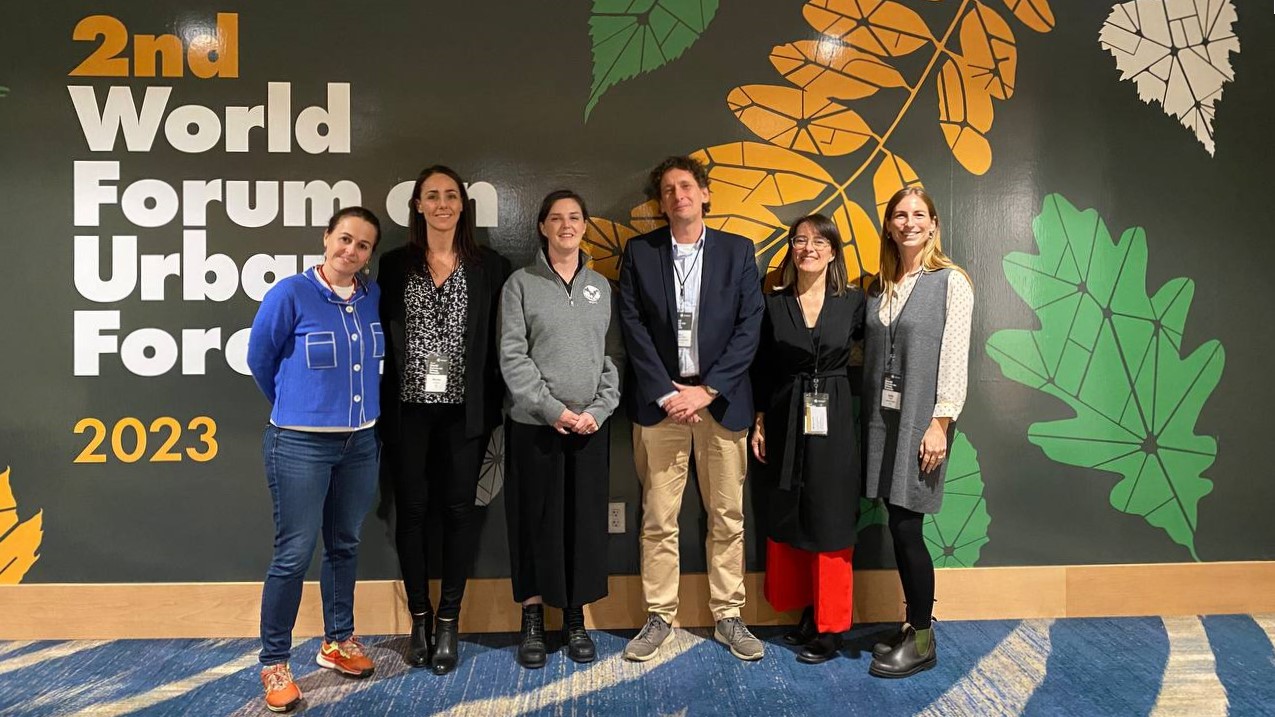
In Washington DC, the Uforest team held a sessions on bridging continents to shape the future of urban forestry education
The World Forum of Urban Forests, hosted in Washington DC in October 2023, showcased a diverse and enlightening array of presentations, with one session organized by the Uforest team titled “Training the Urban Foresters of Tomorrow: Connecting Europe, America, and Africa Experiences“. The session had a double objective, the one to present the Uforest project, its training programs, linking it to the efforts made in Europe, America, and Africa to advance urban forestry education; and the one of presenting the Uforest Alliance, as an opportunity to reflect on possible synergies with other existing networks and useful steps forward.
What was the Uforest session about?
Kicked off by Ilaria Doimo (Etifor) and Sofia Paoli (Politecnico di Milano), they shed a light on the Uforest project, brought as a virtuous model in the European context. The presentation showcased the project’s results with a special focus on its innovative training programs. Emphasizing their instrumental role in shaping the future of urban forestry, participants gained insights into transdisciplinary approaches and methodologies, including the impactful MOOC (Massive Open Online Course) “Nature in the city: turning knowledge into urban forestry practice”, laying a robust foundation for urban foresters globally.
Connecting with other interesting initiatives
The session gave us the opportunity to open and link with other excellent initiatives. Among which, Sara Barron, Director of Urban Forestry Programs at the University of British Columbia, delivered a compelling lecture on the “Strategic Development of International Urban Forestry Education“. With a strong foundation laid during the “Urban Forestry Educators Symposium” she organized in 2023, professor Barron has embarked on a journey exploring critical research questions. Her inquiries include unraveling the distinctive elements that make international urban forestry a unique domain of study. Additionally, she is probing into the defining attributes, encompassing knowledge, skills, and competencies, that distinguish graduates in this field. This comprehensive approach reflects professor Barron’s commitment to pushing the boundaries of understanding in urban forestry education.
Following, Michela Conigliaro, representing the FAO Forestry Division, presented the training course “Integrated Urban Planning for African Cities“. Developed in collaboration with Politecnico di Milano and the African Center for Cities, this initiative sought to enhance the capacity of African cities in integrating urban forestry, urban agriculture, and urban food systems into urban and territorial planning. The outcome, a comprehensive online training package consisting of 10 webinars, was successfully delivered to 12 cities, tested, and proven effective in two selected urban centers.
An interactive session about the Uforest Alliance
Lastly, Rik De Vreese representing both the European Forest Institute (EFI) and the European Forum Urban Forestry (EFUF), showcased the Uforest Alliance, the results of these 3 years of the project. At the same time, Dr. De Vreese presented a recent development: EFUF joining the project’s partnership with the aim of integrating the Alliance and guarantee its life after the project ends. Dr. De Vreese then opened the floor for a facilitated discussion with the audience on the future look and features of this Alliance.
The sesssion continued with an interactive discussion using SLI.DO. 46 engaged participants from around the world actively contributed, enriching our vision and ideas for the future of the Uforest Alliance. While the majority hailed from the USA, participants from Italy, Peru, Bangladesh, Ghana, Mexico, the UK, and Guam added an international dimension to the discussion. Notably, half of the audience represented the public sector, underscoring the significance of collaborative efforts between governmental bodies and educational institutions.
We asked participants which kind of services the Alliance should offer to its members to be useful and effective. Most people feelt it needs to provide mostly knowledge sharing opportunities and online courses, other than meeting, events, webinars, in presence courses and visibility for other contents. Interestingly, other ideas came up, such as creating a space for sharing job and internship opportunities in the field, but also mentoring for students and advocacy efforts to advance the filed.
In the effort of being operative, we also asked the audience how they imagined contributing to the alliance and the majority answered through teaching and contributing to the educational and learning opportunities, and through sharing of relevant material.
Lastly, we asked what would make the Uforest Alliance really useful to their eyes, what features are still missing in other network and alliances that would make this one unique. Well, accessibility results to be crucial to be able to effectively connect and create a lively community that is wide and international welcoming other regions (such as Africa) and professionals from adjacent sectors. It will be important also to find effective ways to engage with youth and creating spaces and tools to create (sub)networks and regional groups.
The World Forum of Urban Forests served as a catalyst for fostering global connections in the field of urban forestry. The “Training the Urban Foresters of Tomorrow” session stood out as a virtuous example of collaboration, seamlessly weaving together experiences from Europe, America, and Africa. In the face of urban challenges, initiatives like these pave the way for a sustainable and interconnected future in urban forestry education. The profound impact of the different training presented is poised to elevate the standards of teaching and learning for numerous urban forestry students, both in the present and well into the future.
Author:
Sofia Paoli (Politecnico di Milano)






